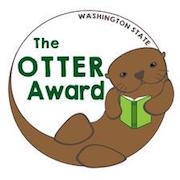|
WLA Book Awards Home | The Otter Award | Nominees | Selection Process |
Voting | Promotion | Educator's Guides and Links | About Otter Award | The Committee | Award History
About the Otter Award 
Why we saw a need for this award:
1. Too many students are struggling to make the transition from picture books & beginner readers (represented by the WCCPBA) to longer, more complex chapter books (represented by the Sasquatch Award). The result: they stop reading. This award would help solve that problem. With a short list of nominees – six titles per year – and titles that include traits that support transitional readers (font size, line spacing, white space, and meaningful illustrations, etc.), students can have access to titles that are developmentally appropriate for their reading needs.
2. With less publicity and visibility, transitional chapter books often fall by the wayside. Librarians, teachers, and parents would benefit from a curated list of the best transitional titles each year. This award would be an invaluable help to librarians looking for high quality and up-to-date additions to their collections.
3. Parents and teachers respond well to book awards and nominees. By publishing a list of titles, teachers and parents will have a well-curated, quality resource to use when looking for “the best” titles for their transitional readers and students.
4. Kid approval is the key to transitional readers. We know that children like to read what others have liked. By focusing this award list on books kids like, not books adults think kids should like, more children across the state will be reading and talking about literature. Nominees will be vetted by child readers so that all titles have a kid stamp of approval.
5. The idea for this award was born at nErDCamp Bellingham in February of 2015. The original OTTER co-chairs, Arika Dickens and Monica Hodges, met at the free book table and started chatting about the need for a good list of new transitional chapter books with maybe an award, like the Sasquatch Award, but for younger students. We exchanged Twitter information, piloted the program in our own districts, and applied for the award through WLMA.
|


